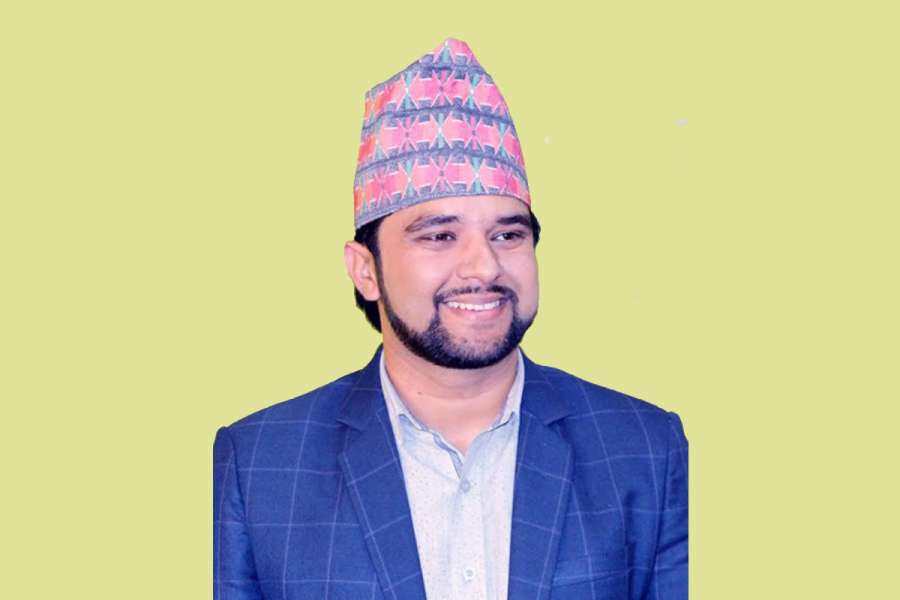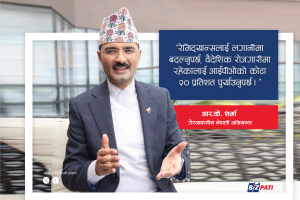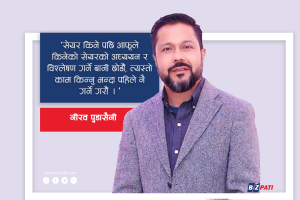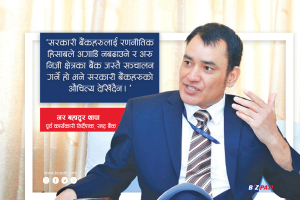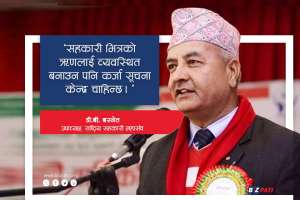
Deepak Raj Bhatt
We may have heard about doctors and hospitals. If someone immediately talks about these, we think of them as a person and a place to cure health. But many of us may not know that there are also doctors among us, who are working to unite people's broken hearts. They also work in hospitals established at different corners of the country. "Just as doctor performs a health check-up and treats, if necessary, the torn body parts are stitched with a metal needle; In the same way, these doctors heal the broken hearts of the people through the needle of dialogue and thread of trust." Huge amount of financial investment is done in health sector but the investment in such hospitals to give life to human being with curing broken hearts is at the scratch.
People's hearts get broken due to differently perceived opinions, interests, values or needs to acquire access and control over resources, which sharply divide families, society and even whole nation. There are plenty of events that dissension widens the ripped mind of people to shreds and eventually causes the loss of human life. Sometimes, the argument on a minor issue escalates into a violence to cause life loss and massive property damage. There are many approaches at community and higher level to resolve and manage these conflicts such as using legal procedures, police force, administrative efforts, religious means etc. but these methods of dealing with conflict fails to address the hidden agendas of conflict or ripped minds are not properly stitched, so even when certain agreements are made and conflict is seen to be resolved for a time being, it resurges affecting more lives. If the conflict settlement does not reach the spirit of mutual understanding and cooperation among the conflicting parties, they resort on killing or being killed. Such a situation is observed not only at individual level but also at societal level. Such a circumstance of conflict has definitely polarized the people in communities to hinder the development efforts.
All levels of conflicts from individual to multi-stakeholder
should be transformed in a sustainable way. For this, conflicting parties
should be empowered to rise above their agendas and come to an agreement
addressing each other's inner desires with win-win feeling. It can be achieved
only through mediation. Of the various techniques and mechanism of the
alternative dispute resolution, it is heartening to note that government and
the judiciary in Nepal encourage mediation as a best cure.
To settle
conflict through mediation, established mediation centers at all levels of
courts and in all 753 local governments, are the hospitals to unite broken
hearts and trained mediators working in these centers are the doctors of it. Mediators
are the supportive wings to judicial sector.
What is Mediation?
Mediation is a
voluntary process conducted confidentially in which a trained neutral person,
known as a mediator, assists parties in working towards a negotiated agreement
of a dispute or difference, with the parties themselves remaining in control of
the decision to settle and the terms of any resolution. Mediation Act, 2068 (2011) Section 2 (h) defines "Mediation"
as a process to be followed to settle a dispute or case with the assistance of
a mediator. Similarly, Section 2 (i) defines mediators as "Mediator" as
a mediator appointed pursuant to this Act who facilitates for negotiation
between the mediation parties and motivates them in arriving at a voluntary
agreement. Mediation stands on four major
pillars: impartiality, confidentiality, empowerment and recognition. The primary goal of mediation process is to work out a
solution the disputing parties can live with and trust. The process focuses on
solving problems with strengthening relationships in an economical manner
contrary to litigation process with high cost and ending the case in a win loss
situation.
What are Legislative Provisos?
Though the mediation was formally endorsed in judicial
body in Nepal since 17 Nov. 2003, it is
institutionalized only after the promulgation of Mediation Act. 2068 (2011) and
Mediation Rule 2070 (2013). Nepal is among the few countries in the
world to introduce such a comprehensive umbrella law, to enhance and
institutionalize mediation as an instrument of alternative dispute resolution among
the nations in south Asia. Nepal is next to Srilanka to introduce the law to
promote and enhance the approach both at the judiciary and local level. Likewise, Article 51 of the Constitution of Nepal has provisioned to pursue alternative means such as
mediation and arbitration for the settlement of disputes of general nature. Article 127
of the constitution has provisioned to form judicial bodies at the local level to pursue alternative dispute
settlement methods in addition to District Court,
High Court and Supreme Court of Nepal. Moreover, to increase access to justice and
bridge the formal/informal justice divide, the Constitution envisioned judicial
committees at each of the 753 local governments. The chapter
8, Section 46 to 53 of the Local Government Act 2074 (2017), deals with
judicial duties of the local government. The Act defined conflicts that has to
be resolved by judicial committee in Section 47 (1) and through mediation only in
Section 47 (2). Before adjudicating cases of 47(1), it has provisioned that, the
judicial committee should empower conflicting parties to resolve the case through
mediation process. Likewise, section 49 (3) explains that mediators listed by
judicial committee are eligible for mediating cases listed in section 47(2).
Moreover, Section 49 (10) explained about the establishment of
mediation centers at ward level to support the functions of judicial committee
and make dispute resolution services available and accessible to the common people.
Besides these, mediation as a dispute settlement
mechanism has been mentioned in other thematic laws such as civil procedure (code) 2017,
criminal procedure (code) 2017, labor Act, Domestic Violence (Offence and
Punishment) Act. 2009 etc.
Qualification of Mediators
Mediation Council of Nepal has finalized the
basic mediation course of content on 23 Nov. 2015 for the uniformity throughout
the country. Three years later, on 25 Feb. 2019, it was amended by
incorporating necessary elements of mediation and has been used all over the
country. One should have taken at least 40 hours training out of 48 hours to
become eligible for mediator, as per Mediation Rule. Not all organizations and
person can organize mediation trainings. Only the organizations listed in
Mediation Council are eligible to provide trainings and perform mediation
activities.
How Mediation is Done?
Unlike a judge or an arbitrator, the mediator won’t
decide the outcome of the case. The mediator's job is to help the disputants
resolve the problem through a process that encourages each side to agree on a
mutual satisfactory solution.
The primary goal is for all parties to work out a
solution they can live with and trust. Because the mediator has no authority to
impose a decision, nothing will be decided unless both parties agree to it. The
process focuses on solving problems in win – win situation. Mediators use following
steps to settle interpersonal conflict cases.
- First Stage: Opening Statement and introduction
- Second Stage: Formulation
of Basic Rules and Approval
- Third Stage: Case Presentation and Information
Collection
- Fourth Stage: Understand Each Other's Perspectives and Conflict
Issue Identification
- Fifth Stage: Private Caucus
- Sixth Stage: Alternatives Identification and Evaluation
- Seventh Stage: Agreement
and Its Implementation
Using above seven stages of
mediation process, the mediators are resolving disputes with improving relationships
among conflict associated parties through mediation centers established in courts
and local levels. Even during the lockdown amid COVID-19 pandemic, when all judicial
service providers were closed, the mediators continued their services at community
level. They even supported with fullhearted to local governments in managing
quarantines and isolations.
Challenges of Mediation in Nepal
Mediators have been given less attention for their
sustainability. Payment to mediators after service delivery is constrained by
the law – which is very less. So, they have to rely on other businesses for
their sustenance. Mediation movement strengthened only when it can be run professionally.
Mediation should be a choice for mediators rather than option.
Secondly, there is some complication regarding case registration process in local government operation Act. According to the Act, while registering cases, it should be registered in judicial committee at first. After reviewing it by the committee, if it can be settled only through mediation, then the committee may forward it to mediation center, chosen by conflicting party. Then only the mediators can start mediation process. The core value of mediation is to have accessible justice to all. This provision put people on trouble than easiness. In some areas, especially in mountain and hilly, people have to walk one or two days to reach local government office. In some local governments, the judicial committee accepts appeal written only from lawyers. Therefore, these practices will create mini courts at local level and put people on financial burden and consume their times as well. It should be amended and judicial committee shall grant authority of case registration at ward level. In some cases, mediation centers and mediators remained dormant for service delivery owing to judicial committee. They have been found to be handling disputes outside their jurisdiction. The deputy mayors are neither trained in adjudicating disputes nor have temperament to act as judge and deliver verdict in an adversarial and competitive mode.
Thirdly, after the promulgation of Constitution of Nepal and enactment of local government operation Act. some confusions were found, which is affecting at some extent to effectively implement mediation activities at local level. The Constitution lists the functions of the local government in its schedule-8. It has placed management of local courts, mediation and arbitration under the list of local level power. Therefore, local governments assume, it's their right to formulate policies related to mediation as per their convenient and practiced it in while preparing judicial committee's working procedure in all local government. It causes inconsistencies in mediation practices. While dealing with this issue, the mediation council says, all mediation related activities especially, selection of mediators, mediation trainings, selection of training providers, etc. should be done in accordance to Mediation Act and its Rule.
Another challenge
is, while capacitating local people as a mediator, the Act has provisioned
Bachelor degree in terms of education, but it became challenging to find bachelor
passed local people who can support voluntarily at local level. However, most of the local governments have
trained and registered mediators without following this rule; the council doesn't
recognize such trained person as mediator if s/he doesn’t have bachelor degree
certificate from any discipline. Therefore, it should be revised, so that,
qualified and experienced people can be mobilized in this sector even though they
don’t have such degree.
Conclusion:
There is no doubt that mediators are providing excellent social service in communities by providing access to justice, especially for the poor and marginalized people. Investment on these doctors and hospitals should be increased from governmental and non-governmental level. Regular capacity enhancement programs for registered mediators and well-equipped mediation centers should be stablished in all 6,743 wards of all local governments. These centers will be the first step of conflict resolution. Further, Judicial committees can take benefits from organizations registered in Mediation Council for the technical support while initiating mediation movement. Public awareness programs should be conducted to demonstrate benefits of mediation in solving conflicts. Likewise, the legal complications observed in terms of mediator's mobilization and implementing mediation activities should be amended for further deepening of this movement. Judicial committees have opportunities to utilize these capable resources in maintaining peace and harmony at their localities.
Mediators are vital for the social transformation. They are working voluntarily to create just, peaceful and civilized society. They facilitate cases keeping social justice in their mind. They can be a strong pillar to meet plans and policies of the government. The 15th five-year plan (2076/077-2080/081) also envisage to create self-sustaining, inclusive and civilized societies for peaceful Nepal. It also aimed to promote sustainable peace by enabling social justice and conflict transformation activities. The role of mediators is very crucial in achieving mandates of the plan. Likewise, the government is committed to achieve sustainable development goals before 2087 BS. Mediators can contribute remarkably in meeting goal 16 (Promote peaceful and inclusive societies for sustainable development, provide access to justice for all and build effective, accountable and inclusive institutions at all levels) of SDGs. They can be supportive in justifying slogan of the government of Nepal, 'happy Nepali and prosperous Nepal'. It can be achieved only when there is peace. If people live in conflict less societies, it supports to uplift developmental activities, which will ultimately support in economic growth of the country and boost livelihood.
(The Writer is working
as Senior Program Officer in Natural Resource Conflict Transformation Center-Nepal)



